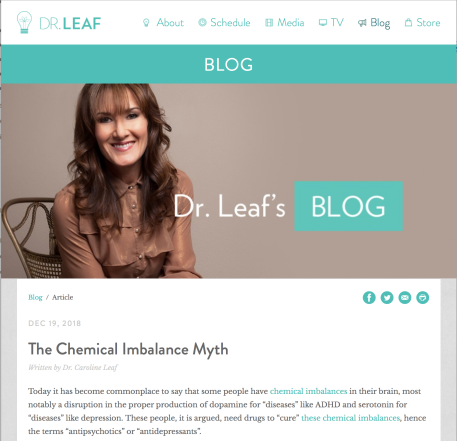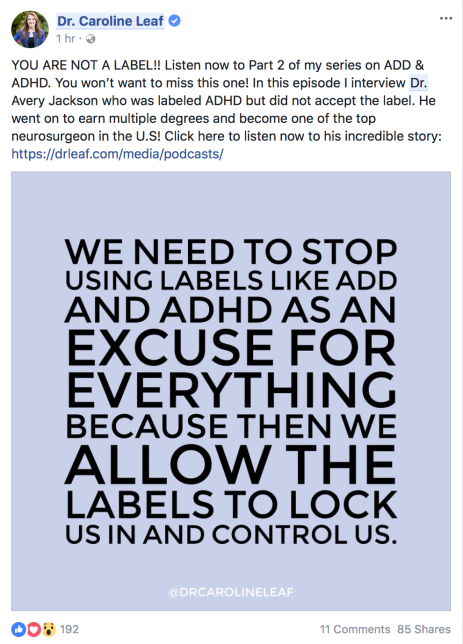“I feel awful, doc”, one man said to me today. “I’m never going to call a cold ‘the flu’ again”, he said as he shivered away under three jumpers, aching and mildly delirious.
It’s the middle of winter here in Australia, and Influenza A is cutting a swathe through the community. Everyone who walks in with a stuffy nose thinks they have ‘the flu’, that is, until they actually get Influenza and they realise just how atrocious having the real flu is.
It’s the same with mental health and illness. So many people think think that anxiety or depression aren’t real diseases. They think that everyone gets a bit sad at times, or gets a bit stressed, so depression and anxiety aren’t real diseases, they’re just normal emotions, or what weak people experience because they don’t have the inner strength to cope.
Such stigma isn’t helped when people who like to think they’re experts in mental health write blogs which declare that “anxiety is a signal that we need to listen to, not an illness we need to manage. It is a reaction to life’s challenges, not a biological disease to be treated.”
Yes, that’s right people, pretend experts are quick to tell you that the debilitating condition you’re experiencing isn’t a real disease.
Saying “Anxiety isn’t a real disease, it’s just a warning sign, a normal part of life” is a bit like saying, “You don’t really have Influenza, you just have a cold. Harden up princess … you don’t need to be ventilated in ICU, it’s just a virus. I took some Vitamin C and I was better in just a couple of days. What’s wrong with you?”
Part of the problem is because of how we use the word “anxiety”, which can mean different things to different people. To a lot of people, being anxious is the same as being a little frightened. To others, it’s being really scared, but with good reason (like if you were confronted by a very venomous snake).
Medically speaking, anxiety isn’t just being frightened or stressed. After all, it’s normal to be frightened or stressed. A little bit of fear is protective. There are dangers all around us, and our brain is our “don’t get killed” organ. If we had no fear at all, we’d end up becoming road kill. A little bit of fear, in the right amount, for the right reason and in the right place and time, is actually very protective.
But to label all anxiety as normal, or to claim that anxiety is not a mental illness is obnoxious and ignorant.
That’s because anxiety at the wrong time and in the wrong amount can disrupt our day-to-day tasks and make it hard to live a rich and fulfilling life. At the extreme, anxiety disorders are as debilitating as any major illness.
There are six main disorders that come under the “anxiety disorders” umbrella, reflecting either an abnormal focus of anxiety or an abnormal intensity:
1. Panic Disorder (abnormally intense anxiety episodes)
2. Social Anxiety Disorder (abnormal anxiety of social interactions)
3. Post-traumatic Stress Disorder (abnormally intense episodes of anxiety following trauma)
4. Obsessive-Compulsive Disorder (abnormally intense and abnormally focussed anxiety resulting in compulsive behaviours)
5. Specific phobias (abnormally focussed anxiety on one particular trigger), and
6. Generalised Anxiety Disorder (abnormal anxiety of everything)
The common underlying theme of anxiety is uncertainty. Clinical psychologists Dan Grupe and Jack Nitschke from the University of Wisconsin wrote in Nature Reviews Neuroscience that “Anxiety is a future-orientated emotion, and anticipating or ‘pre-viewing’ the future induces anxiety largely because the future is intrinsically uncertain.” [1]
The fear of uncertainty that defines anxiety comes from genetic changes that affect the structure and function of the brain, primarily in the regions of the amygdala and the pre-frontal cortex. As a result of these changes, the brain processes information incorrectly.
For example:
> the brain thinks that threats are more likely and will be worse than they are,
> the brain spends more time looking for possible threats,
> the brain fails to learn what conditions are safe, which is aggravated by avoidance, and
> the brain assumes that unavoidable uncertainty is more likely to be bad than good.
It’s important to understand at this point that anxiety disorders aren’t the result of poor personal choices. They’re the result of a genetic predisposition to increased vulnerability to early life stress, and to chronic stress [2]. The other way of looking at it is that people who don’t suffer from anxiety disorders have a fully functional capacity for resilience [3,4].
The main point of this post is simply this – pretend experts are everywhere, and they are usually various combinations of ignorant, stupid or lazy. They might try and tell you that your debilitating anxiety isn’t really a mental illness, but they’re usually the ones who have never experienced just how atrocious a true anxiety disorder is. Don’t listen to them, no matter how many equally ignorant followers they have on social media. Just like Influenza can make you really sick but there is treatment, so it is with an anxiety disorder – the anxiety disorder may be much harder to get through, but with the right treatment and support, you can get through it.
~~~
If you are struggling with anxiety or depression, help … real help … is available. See your general practitioner or psychologist, or if you’re in crisis and you need to talk to someone urgently:
In Australia
> you can call either Lifeline on 13 11 14, or
> BeyondBlue provides a number of different support options
> the BeyondBlue Support Service provides advice and support via
>> telephone 24/7 (call 1300 22 4636)
>> daily web chat (between 3pm–12am) and
>> email (with a response provided within 24 hours) via their website https://www.beyondblue.org.au/about-us/contact-us.
In the US
> call the National Suicide Prevention Lifeline by calling 1-800-273-TALK (8255).
In New Zealand
> call Lifeline Aotearoa 24/7 Helpline on 0800 543 354
In the UK
> Samaritans offer a 24 hour help line, on 116 123
For other countries, Your Life Counts maintains a list of crisis services across a number of countries: http://www.yourlifecounts.org/need-help/crisis-lines
References
1. Grupe DW, Nitschke JB. Uncertainty and anticipation in anxiety: an integrated neurobiological and psychological perspective. Nature reviews Neuroscience 2013 Jul;14(7):488-501.
2. Duman EA, Canli T. Influence of life stress, 5-HTTLPR genotype, and SLC6A4 methylation on gene expression and stress response in healthy Caucasian males. Biol Mood Anxiety Disord 2015;5:2.
3. Wu G, Feder A, Cohen H, et al. Understanding resilience. Frontiers in behavioral neuroscience 2013;7:10.
4. Russo SJ, Murrough JW, Han M-H, Charney DS, Nestler EJ. Neurobiology of resilience. Nature neuroscience 2012 November;15(11):1475-84.









